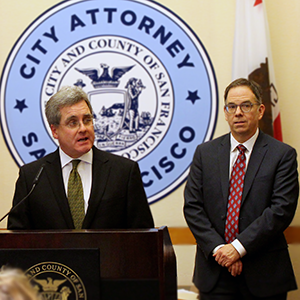Yet another illegal conversion of a residential development by city commissioner demonstrates ‘a pattern that is well-devised, carefully-executed and, above all, willful’

SAN FRANCISCO (July 28, 2015) — City Attorney Dennis Herrera has amended his civil suit against city commissioner Mel Murphy to include another residential property that the veteran developer converted in violation of state and local laws, and then deliberately concealed for years from his annual disclosures to the San Francisco Ethics Commission.
The new allegations involving Murphy’s property at 1025 Hampshire Street mirror a pattern of lawlessness and deception that Herrera’s investigation uncovered at another Mission District project Murphy developed and illegally converted on Alabama Street. In willful defiance of Planning Code restrictions that limit residential developments in Hampshire Street’s zoning district to one- and two-family homes, Murphy deceived multiple city agencies by filing applications, plans and other documents to create the fiction of a lawful two-unit development — while clearly intending to alter the project to ultimately include three dwellings. As with Murphy’s similarly illegal conversion of his Alabama Street property, none of the building, plumbing or electrical work necessary to create an additional, unlawful unit on Hampshire Street was done with requisite approvals or inspections. Murphy continued to perpetrate both deceptions for years as a city official, omitting the Alabama Street and Hampshire Street properties from his statements of economic interests, which he was required to file annually as a building inspection commissioner between 2006 and 2012, and as a port commissioner since 2013.
Murphy finally disclosed his real property interests and rental income from the Alabama Street and Hampshire Street properties in amended statements for 2012, 2013, and 2014, which he filed on June 3, 2015 — two months after Herrera sued Murphy for far-reaching unlawful conduct.
“I’ll say this for Mel Murphy: he’s consistent,” Herrera said. “Murphy’s illegal conversion schemes demonstrate a pattern that is well-devised, carefully-executed and, above all, willful. He flouts laws for ill-gotten profits; he deceives city agencies at every possible turn; and he goes the extra mile to conceal his wrongdoing even years later as a city official. As a member and president of the Building Inspection Commission for six years, Mel Murphy was charged with enforcing laws he himself defied, repeatedly and remorselessly. In fact, his role on that commission often required adjudicating disputes and meting out punishments to others for their own violations. As a city official, Commissioner Murphy’s conduct is a betrayal of public trust by that I’m sure many San Franciscans find discouraging. But it also underscores the importance of our case to pursue penalties that are tough and appropriate to the damage done. Our case isn’t solely about punishing wrongdoing, or deterring similar would-be scofflaws. It’s also about restoring confidence in the integrity of our public institutions that has sadly been diminished by Commissioner Murphy’s lawlessness and deception.”
Herrera filed his original civil action against Murphy in San Francisco Superior Court on April 1, 2015, acknowledging in an accompanying news release that the City Attorney’s Office’s investigation remains ongoing. The investigation initially focused on Murphy’s unpermitted work at a vacant building at 125 Crown Terrace, which partially collapsed on Dec. 16, 2013 in the midst of a major renovation and expansion — suspiciously soon after Murphy failed in his attempts to obtain a demolition permit. Once underway, however, Herrera’s inquiry identified evidence of additional violations involving Murphy’s other development projects. The investigation remains underway.
The amended civil complaint filed in San Francisco Superior Court this morning details new allegations involving Murphy’s Hampshire Street property, and also expands on Murphy’s fraudulent concealment and efforts to delay discovery of his past wrongdoing, which are both well-established grounds to “toll” or suspend statutes of limitations under California law. San Francisco Superior Court Judge Ronald E. Quidachay granted Herrera leave to amend in a pre-trial hearing on June 29, 2015, after Murphy’s legal team moved to strike allegations involving Murphy’s illegal conversion of his 1346 Alabama Street property as time-barred. Herrera countered that by concealing evidence and breaching his ethical duty to report his economic interests fully, Murphy lost the shield of a statute of limitations defense.
Other allegations that remain from Herrera’s original complaint involve projects at 125 Crown Terrace and at 3418 26th Street. For Crown Terrace — the development that famously fell from its shoring and slid down a hill in Dec. 2013 — Murphy is alleged to have violated a range of state and local law by maintaining the property as substandard, as a public nuisance, endangering public health and safety, and engaging in unlawful, unfair and fraudulent business practices. Murphy’s 3418 26th Street project in Bernal Heights also violates state and local laws, according to Herrera’s complaint. The 26th Street allegations center on Murphy’s illegal installation of parking equipment, and defiance legal requirements for adequate parking for residents with disabilities. It includes contentions that Murphy performed work without requisite permits, failed to follow permits when he had them, shorted permit fees by tens of thousands of dollars, and also engaged unlawful, unfair and fraudulent business practices.
The case is: City and County of San Francisco and People of the State of California v. Mel Murphy et al., San Francisco Superior Court, number 15-545031, filed April 1, 2015. Additional information on the San Francisco City Attorney’s Office is available at: https://www.sfcityattorney.org/.
- PDF of Mel Murphy 1st Amended Complaint Presskit (July 28, 2015)